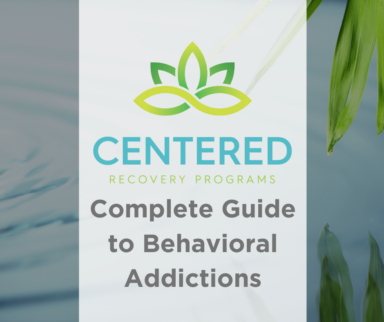Centered Recovery’s unique mindfulness program doesn’t make any claims that aren’t backed by experts in the fields of psychology, neurology, mental health, and addiction. Below are just a few examples of published research that were referenced or used in the creation of this cutting edge, comprehensive program.
Mindfulness-Based Treatment to Prevent Addictive Behavior Relapse: Theoretical Models and Hypothesized Mechanisms of Change. Katie Witkiewitz, Sarah Bowen, Erin N. Harrop, Haley Douglas, Matthew Enkema, and Carly Sedgwick. Retrieved from https://www.ncbi.nlm.nih.gov/pmc/articles/PMC5441879/
Trying to be happier really can work: Two experimental studies, Yuna L. Ferguson, retrieved from https://www.tandfonline.com/doi/abs/10.1080/17439760.2012.747000
Meditative Therapies for Reducing Anxiety: A Systematic Review and Meta-analysis of Randomized Controlled Trials, Chen et al, retrieved from https://www.ncbi.nlm.nih.gov/pmc/articles/PMC3718554/?_escaped_fragment_=po=6.57895
The Effect of Mindfulness-Based Therapy on Anxiety and Depression: A Meta-Analytic Review, Hoffman et al, https://www.ncbi.nlm.nih.gov/pmc/articles/PMC2848393/
Understanding Meditation: How Attention Changes Our Brains. Michael Stanclift, N.D., retrieved from https://www.huffingtonpost.com/michael-stanclift-nd/neuroplasticity_b_1131652.html
Plasticity in the frequency representation of primary auditory cortex following discrimination training in adult owl monkeys. GH Recanzone, CE Schreiner and MM Merzenich, retrieved from https://www.jneurosci.org/content/13/1/87.long
How Science is Unlocking the Secrets of Addiction. Fran Smith, retrieved from https://www.nationalgeographic.com/magazine/2017/09/the-addicted-brain/#close
Antidepressant Use Among Persons Aged 12 and Over: United States, 2011–2014. Pratt et al, retrieved from https://www.cdc.gov/nchs/data/databriefs/db283.pdf
Facts & Statistics, retrieved from https://adaa.org/about-adaa/press-room/facts-statistics
Alcohol Facts and Statistics, retrieved from https://www.niaaa.nih.gov/alcohol-health/overview-alcohol-consumption/alcohol-facts-and-statistics
Mindfulness-Based Therapies for Substance Use Disorders: Part 1 (Editorial). Marcus et al, retrieved from https://www.ncbi.nlm.nih.gov/pmc/articles/PMC2818765/
Brain Scans Show How Meditation Improves Mental Focus. Brian Gowin, retrieved from https://www.psychologytoday.com/us/blog/you-illuminated/201204/brain-scans-show-how-meditation-improves-mental-focus
Practical support aids addiction recovery: the positive identity model of change, Johansen, et al, retrieved from https://bmcpsychiatry.biomedcentral.com/articles/10.1186/1471-244X-13-201
How Mindfulness Makes the Brain Immune to Temptation. Kelly McGonigal, retrieved from
- https://www.psychologytoday.com/us/blog/the-science-willpower/201111/how-mindfulness-makes-the-brain-immune-temptation
Mindfulness-Based Relapse Prevention for Substance Use Disorders: A Pilot Efficacy Trial, Bowen, et al, retrieved from https://www.ncbi.nlm.nih.gov/pmc/articles/PMC3280682/
Relative efficacy of mindfulness-based relapse prevention, standard relapse prevention, and treatment as usual for substance use disorders: a randomized clinical trial, Bowen, et al, retrieved from https://www.ncbi.nlm.nih.gov/pubmed/24647726
The Clinical Efficacy of Mindfulness-Based Treatments for Alcohol and Drugs Use Disorders: A Meta-Analytic Review of Randomized and Nonrandomized Controlled Trials, Cavicchioli M., Movalli M., Maffei C., retrieved from https://www.karger.com/Article/FullText/490762
Meditation and psychotherapy: A rationale for the integration of dynamic psychotherapy, the relaxation response, and mindfulness meditation. Kutz, I., Boryensko, J.Z. & Benson, H.
https://psycnet.apa.org/record/1985-15147-001
Rumination: A Problem in Anxiety and Depression, Margaret Wehrenberg Psy.D. Retrieved from https://www.psychologytoday.com/us/blog/depression-management-techniques/201604/rumination-problem-in-anxiety-and-depression
Wherever You Go, There You Are: Mindfulness Meditation In Everyday Life, Jon Kabat-Zinn.
Mindfulness‐Based Interventions in Context: Past, Present, and Future, Jon Kabat-Zinn. retrieved from https://onlinelibrary.wiley.com/doi/abs/10.1093/clipsy.bpg016
Mindfulness-based Relapse Prevention for Alcohol and Substance Use Disorders, Witkiewitz, Marlatt, and Walker. retrieved from http://www.addictioneducation.co.uk/Witkiewitz%20et%20al%202005.MBRP.pdf
Human Needs, Buddhist Psychology and Mindfulness, Michael Formica. Retrieved from https://www.psychologytoday.com/us/blog/enlightened-living/201301/human-needs-buddhist-psychology-and-mindfulness
A modern take on Maslow’s theory, Virginia Dowdell. Retrieved from https://thegriff.ca/2016/01/modern-take-maslows-theory/
Maslow’s Hierarchy of Needs, McLeod. Retrieved from http://highgatecounselling.org.uk/members/certificate/CT2%20Paper%201.pdf
Impacts of Drugs on Neurotransmission, by Carl Sherman, retrieved from https://www.drugabuse.gov/news-events/nida-notes/2017/03/impacts-drugs-neurotransmission
Alcohol, Sleep, and Why You Might Re-think that Nightcap, by Jordan Gaines Lewis, retrieved from https://www.nature.com/scitable/blog/mind-read/alcohol_sleep_and_why_you
Drug Abuse, Dopamine, and the Brain’s Reward System retrieved from https://www.hazeldenbettyford.org/education/bcr/addiction-research/drug-abuse-brain-ru-915
Feeling Sleepy? An Urge to Nap Is Built In, by Daniel Goleman, retrieved from https://www.nytimes.com/1989/09/12/science/feeling-sleepy-an-urge-to-nap-is-built-in.html
Water, Hydration and Health, by Barry M. Popkin, Kristen E. D’Anci, and Irwin H. Rosenberg, retrieved from https://www.ncbi.nlm.nih.gov/pmc/articles/PMC2908954/
The Danger of Labeling Others (or Yourself). Art Markman, retrieved from https://www.psychologytoday.com/us/blog/ulterior-motives/201406/the-danger-labeling-others-or-yourself
The Far-Reaching Effects of Believing People Can Change: Implicit Theories of Personality Shape Stress, Health, and Achievement During Adolescence. Yeager, et al, retrieved from https://www.researchgate.net/publication/262538735_The_far-reaching_effects_of_believing_people_can_change_Implicit_theories_of_personality_shape_stress_health_and_achievement_during_adolescence
Mind-sets matter: a meta-analytic review of implicit theories and self-regulation. Burnette, et al. retrieved from https://www.ncbi.nlm.nih.gov/pubmed/22866678
The Influence of Emotion on Cognitive Control: Relevance for Development and Adolescent Psychopathology. Sven Mueller, retrieved from https://www.ncbi.nlm.nih.gov/pmc/articles/PMC3223617/.
Perception And Reality. RJ Rummel, retrieved from https://www.hawaii.edu/powerkills/DPF.CHAP7.HTM
Attending to the present: mindfulness meditation reveals distinct neural modes of self-reference, Farb, et al. retrieved from https://academic.oup.com/scan/article/2/4/313/1676557
Mindfulness-Based Relapse Prevention for Substance Use Disorders: A Pilot Efficacy Trial, Bowen, et al. retrieved from https://www.tandfonline.com/doi/abs/10.1080/08897070903250084
Mindfulness-based Relapse Prevention for Addictive Behaviors: A Clinician’s Guide, Bowen, et al. https://books.google.com/books?hl=en&lr=&id=dsNG6s-3faAC&oi=fnd&pg=PP1&dq=mindfulness+based+relapse+prevention&ots=BihmddNiiw&sig=BJGUOFl7PmuuXqa4QOHxIKj5aj8#v=onepage&q=mindfulness%20based%20relapse%20prevention&f=false
When Belief Creates Reality, Mark Snyder, retrieved from https://www.sciencedirect.com/science/article/pii/S006526010860146X
Urge Surfing. retrieved from https://med.dartmouth-hitchcock.org/documents/Urge-Surfing.pdf
Surfing the Urge: Experiential Acceptance Moderates the Relation Between Automatic Alcohol Motivation and Hazardous Drinking. Ostafin and Marlatt, retrieved from https://guilfordjournals.com/doi/abs/10.1521/jscp.2008.27.4.404
Mindfulness-based stress reduction for stress management in healthy people: a review and meta-analysis, A Chiesa and A Serretti, https://www.ncbi.nlm.nih.gov/books/NBK77489/.
When science meets mindfulness, Alvin Powell, https://news.harvard.edu/gazette/story/2018/04/harvard-researchers-study-how-mindfulness-may-change-the-brain-in-depressed-patients/.
Effects of Mindfulness on Psychological Health: A Review of Empirical Studies, Shian-Ling Keng, Moria J. Smoski, Clive J. Robins, https://www.ncbi.nlm.nih.gov/pmc/articles/PMC3679190/.
Sleep Disorders in Substance Abusers, How Common Are They?, Youssef Mahfoud, MD, Farid Talih, MD, David Streem, MD, and Kumar Budur, MD retrieved from https://www.ncbi.nlm.nih.gov/pmc/articles/PMC2766287/
Sleep quality and emotions affect opioid addiction recovery, Kristie Auman-Bauer, retrieved from https://news.psu.edu/story/443476/2017/01/04/sleep-quality-and-emotions-affect-opioid-addiction-recovery
The Evolutionary Argument Against Reality, Amanda Gefter, retrieved from https://www.quantamagazine.org/the-evolutionary-argument-against-reality-20160421/
Human Vision as a Reality Engine. Hoffman, retrieved from http://cogsci.uci.edu/~ddhoff/HoffmanFABBS.pdf
Addiction as temporal disruption: interoception, self, meaning. Kemp, retrieved from https://link.springer.com/article/10.1007%2Fs11097-018-9578-7
Effects of coping skills training on generalized self-efficacy and locus of control. Ronald Smith, retrieved from https://psycnet.apa.org/record/1989-20710-001
Handbook for Strategic HR – Section 3: Use of Self as an Instrument of Change. Network, et al. Retrieved from https://books.google.com/books?hl=en&lr=&id=oDRxCQAAQBAJ&oi=fnd&pg=PT53&dq=deep+listening&ots=xU0FpwaJfg&sig=EtkOvKsAnd8GP3scu4Igq4U4Hkc#v=onepage&q=deep%20listening&f=false
Listening: A Vital Skill. Kenneth C. Petress. retrieved from https://go.galegroup.com/ps/anonymous?id=GALE%7CA62980773&sid=googleScholar&v=2.1&it=r&linkaccess=abs&issn=00941956&p=AONE&sw=w
Why Don’t We Listen Better?: Communicating & Connecting in Relationships. Jim Petersen, retrieved from https://books.google.com/books?hl=en&lr=&id=3bmS4oovMnQC&oi=fnd&pg=PR5&dq=better+listening+for+better+communication&ots=qAtKuOlPZJ&sig=rlJMdEeub-ebOM01-iiDfUJRLs4#v=onepage&q=better%20listening%20for%20better%20communication&f=false
Understanding Delusions. Chandra Kiran, Suprakash Chaudhury, retrieved from https://www.ncbi.nlm.nih.gov/pmc/articles/PMC3016695/
The consequences of fear. David Ropeik, retrieved from https://www.ncbi.nlm.nih.gov/pmc/articles/PMC1299209/
Fear, Anger, and Risk. Lerner and Keltner, retrieved from https://fbaum.unc.edu/teaching/articles/Lerner-2001-FearAngerRisk.pdf
How does stress increase risk of drug abuse and relapse? Since R. retrieved from https://www.ncbi.nlm.nih.gov/m/pubmed/11797055/
How Labels Limit Us and We, In Turn, Limit Our Own Potential. Michael J Formica MS, MA, EdM, retrieved from https://www.psychologytoday.com/us/blog/enlightened-living/200807/how-labels-limit-us-and-we-in-turn-limit-our-own-potential
Measuring Codependency, Fisher and Spann. retrieved from https://www.tandfonline.com/doi/abs/10.1300/J020V08N01_06
The Role of Acceptance and Job Control in Mental Health, Job Satisfaction, and Work Performance, Bond and Bunce. retrieved from https://psycnet.apa.org/record/2003-09785-007
Narratives of recovery from addictive behaviours, Hanninen and Koski-Jannes, retrieved from https://onlinelibrary.wiley.com/doi/abs/10.1046/j.1360-0443.1999.941218379.x
Co-Dependency. https://www.mentalhealthamerica.net/co-dependency
6 Signs of a Codependent Relationship. Linda Esposito, retrieved from https://www.psychologytoday.com/us/blog/anxiety-zen/201609/6-signs-codependent-relationship
What Codependency Is, and What It Isn’t. Ann Smith, retrieved from https://www.psychologytoday.com/us/blog/healthy-connections/201507/what-codependency-is-and-what-it-isnt
Neuroscience Research Shows How Mood Impacts Perception. Susan Krauss Whitbourne, retrieved from: https://www.psychologytoday.com/us/blog/fulfillment-any-age/201611/neuroscience-research-shows-how-mood-impacts-perception
How emotions affect logical reasoning: evidence from experiments with mood-manipulated participants, spider phobics, and people with exam anxiety, by Nadine Jung, Christina Wranke, Kai Hamburger, and Markus Knauff retrieved from: https://www.ncbi.nlm.nih.gov/pmc/articles/PMC4050437/
The role of positive emotions in positive psychology: the broaden-and-build theory of positive emotions, by Fredrickson, B. American Psychologist, 56 (3), 218–226, retrieved from http://dx.doi.org/10.1037/0003-066x.56.3.218
Mindfulness and Emotion Regulation: Insights from Neurobiological, Psychological, and Clinical Studies, by Simón Guendelman, Sebastián Medeiros, and Hagen Rampes, retrieved from https://www.ncbi.nlm.nih.gov/pmc/articles/PMC5337506/
Stress relief from laughter? It’s no joke, retrieved from: https://www.mayoclinic.org/healthy-lifestyle/stress-management/in-depth/stress-relief/art-20044456
The Science of Laughter, by Robert Provine, retrieved from: https://www.psychologytoday.com/us/articles/200011/the-science-laughter
Social laughter is correlated with an elevated pain threshold, by R. I. M. Dunbar , Rebecca Baron , Anna Frangou , Eiluned Pearce , Edwin J. C. van Leeuwen , Julie Stow , Giselle Partridge , Ian MacDonald , Vincent Barra and Mark van Vugt
Published:14 September 2011https://doi.org/10.1098/rspb.2011.1373 retrieved from https://royalsocietypublishing.org/doi/full/10.1098/rspb.2011.1373
Laugh it Up: Why Laughing Brings Us Closer Together, retrieved from: https://www.psychalive.org/laugh-it-up-why-laughing-brings-us-closer-together/
Science Proves That Gratitude Is Key to Well-Being, Andrea Brandt, PhD, retrieved from https://www.psychologytoday.com/us/blog/mindful-anger/201807/science-proves-gratitude-is-key-well-being
The Effects of Two Novel Gratitude and Mindfulness Interventions on Well-Being, Karen O’ Leary, MA, and Samantha Dockray, PhD, retrieved from https://www.researchgate.net/profile/Karen_Matvienko-Sikar/publication/274317810_The_Effects_of_Two_Novel_Gratitude_and_Mindfulness_Interventions_on_Well-Being/links/55310e440cf2f2a588abfccd/The-Effects-of-Two-Novel-Gratitude-and-Mindfulness-Interventions-on-Well-Being.pdf
The Science and Research on Gratitude and Happiness, Erica Stoerkel, retrieved from https://positivepsychology.com/gratitude-happiness-research/
The brain on silent: mind wandering, mindful awareness, and states of mental tranquility. Vago and Zeidan, retrieved from https://www.ncbi.nlm.nih.gov/pmc/articles/PMC5866730/
Know Your Brain: Default Mode Network. retrieved from https://neuroscientificallychallenged.com/blog/know-your-brain-default-mode-network
The brain’s default network: anatomy, function, and relevance to disease. Buckner, et al. retrieved from https://www.ncbi.nlm.nih.gov/pubmed/18400922
Why New Years Resolutions Fail. Shainna Ali, retrieved from https://www.psychologytoday.com/us/blog/modern-mentality/201812/why-new-years-resolutions-fail
The Psychology Behind New Years Resolutions. Mark Griffiths, retrieved from https://www.iflscience.com/brain/psychology-new-year-s-resolutions/
5 Tips for Setting Healthy Goals, David Feldman, retrieved from https://www.psychologytoday.com/us/blog/supersurvivors/201902/5-tips-setting-healthy-goals
Mental practice and physical practice in learning a motor skill. Twining, W. E. retrieved from https://psycnet.apa.org/record/1950-03080-001.
The Future of Memory: Remembering, Imagining, and the Brain. Spachter, et al. retrieved from https://www.ncbi.nlm.nih.gov/pmc/articles/PMC3815616/
4 Scientific Reasons Why Visualizations Will Increase Your Chances to Succeed. Emilie Pelletier, retrieved from https://entrepreneurs.maqtoob.com/4-scientific-reasons-why-visualization-will-increase-your-chances-to-succeed-5515ef2dbdb7








